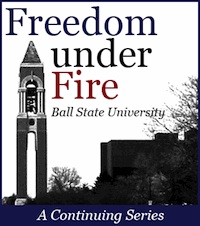 Education
Education
 Free Speech
Free Speech
In Twin Cases, "Academic Integrity" Is Newspeak for “Speech Code”

If you’re familiar with the news we report at ENV, you probably know that Indiana’s Ball State University and Texas’s Amarillo College each cancelled a course treating the subject of intelligent design. You probably don’t know that critics of the courses on both campuses dismissed concerns about academic freedom with a cursory appeal to “academic integrity,” a noble-sounding phrase that has been used in these twin cases to mask less-than-noble behavior.
Academic freedom doesn’t just sound noble. It has long made higher education capable of good. It warded off from arbitrary closure that enlightening (if controversial) course you took as an undergrad. Your favorite professor in graduate school, the one who really helped you along your way, did so under academic freedom’s protection.
Academic freedom began public life as a set of principles articulated in 1915 and again in 1940 by the American Association of University Professors. These principles amount to much more than added job security for academics. Courts and legal commentators have long described academic freedom as a “special concern of the First Amendment,” which is the part of the U.S. Constitution that deals with free speech and other civil rights essential to modern life in America.
“Academic integrity,” on the other hand, has neither the pedigree nor utility of academic freedom. The American Association of University Professors has never used “academic integrity” to limit the protective reach of academic freedom. The law, too, has never recognized “academic integrity” as a counterweight to the burdens its doctrine on academic freedom places on school administrators.
 It is no surprise, then, that the Ball State University faculty handbook — regularly incorporated by reference into faculty employment agreements — gives academic freedom its due. Like most other handbooks in higher education, the Ball State University handbook sets out an elaborate and highly specified system for adjudicating complaints related to course content and instruction, privileging faculty over school administration in the process, especially in the crucial fact-finding, arbitration and trial-like phases.
It is no surprise, then, that the Ball State University faculty handbook — regularly incorporated by reference into faculty employment agreements — gives academic freedom its due. Like most other handbooks in higher education, the Ball State University handbook sets out an elaborate and highly specified system for adjudicating complaints related to course content and instruction, privileging faculty over school administration in the process, especially in the crucial fact-finding, arbitration and trial-like phases.
Conversely, in the handbook “academic integrity” plays no role in the resolution of complaints regarding course content and instruction, which, again, is on a par with common practice in higher education. Rather, the phrase “academic integrity” is, as you would expect from the word “integrity,” used in the handbook in connection with student cheating, research misconduct, and plagiarism. The recent importation by Ball State University and Amarillo College of “academic integrity” into the domain of academic freedom is straight out of left field.
The use of “academic integrity” as a constraint on academic freedom is unprecedented, exotic, and suspicious. It is risky, too. As the Adams case illustrates, judges and juries will take a keen interest in a school’s departure from the requirements of academic freedom and due process as written into a school’s handbook, particularly when specific promises in a handbook are made binding on school administration by the strictures of contract and employment law, as is often the case. Such departure from established procedure is made all the more risky when coupled with anything that looks like administrative retaliation against a teacher for expression of a minority viewpoint, such as class cancellation or denial of tenure.
Of course, this is also what happened in the twin cases of Ball State University and Amarillo College. I refer to these cases as twins because each bears a striking (almost familial) resemblance to the other, though the similarities are likely coincidental.
Ball State University and Amarillo College were each pressured by a militant atheist group to cancel a class based on its subject matter. Both schools cancelled the targeted course as advised. Both received letters outlining concerns for academic freedom. Each school defended on the grounds of “academic integrity” though neither school has replied in writing as requested to the points raised in the letters. (This not only creates impasse; it signifies disrespect. Justice Scalia once said he replied in D.C. v. Heller to each point raised by Justice Stevens as a matter of respect.) The president of each school, Dr. Gora for Ball State University and Dr. Matney for Amarillo College, each announced their respective intent to resign about six weeks after receiving letters about academic freedom. (For those letters, see here and here.)
These resignations may not be a bad thing. Dr. Gora’s and Dr. Matney’s curious reliance on “academic integrity” to justify imposition of a speech code suggests a dangerous unfamiliarity with academic freedom literature. Even so, Discovery Institute has never suggested in its letters or other communications that either president should resign as a consequence of the impasse on academic freedom or even as a consequence of class cancellation. However, Discovery Institute welcomes the opportunity to continue the conversation on academic freedom with those who will soon succeed Dr. Gora and Dr. Matney.
In the end, what matters is not which school president we work with, but that we get these things right.
